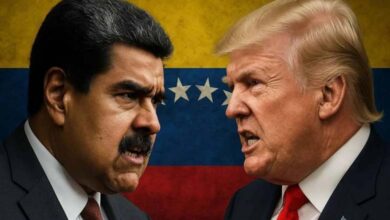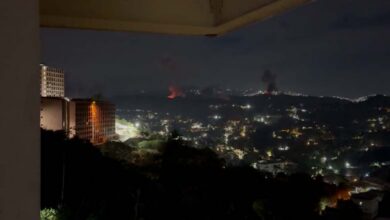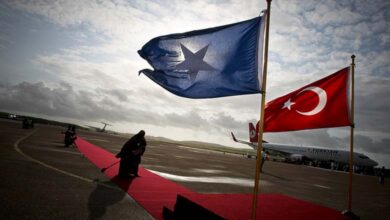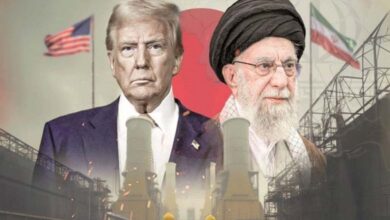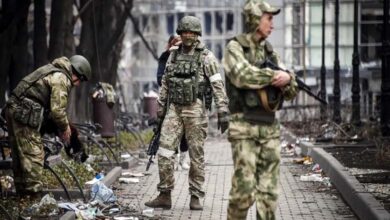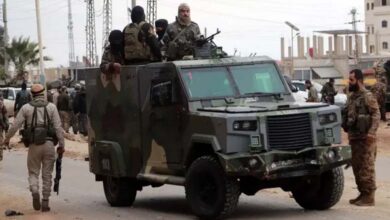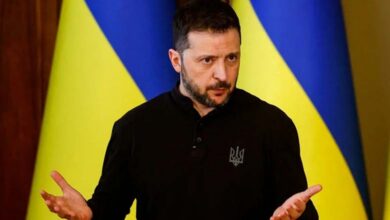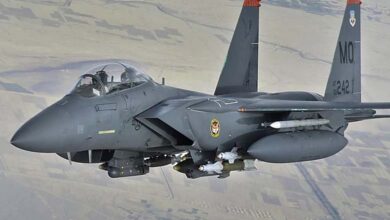Trump Does Not Rule Out Working Toward Regime Change in Iran
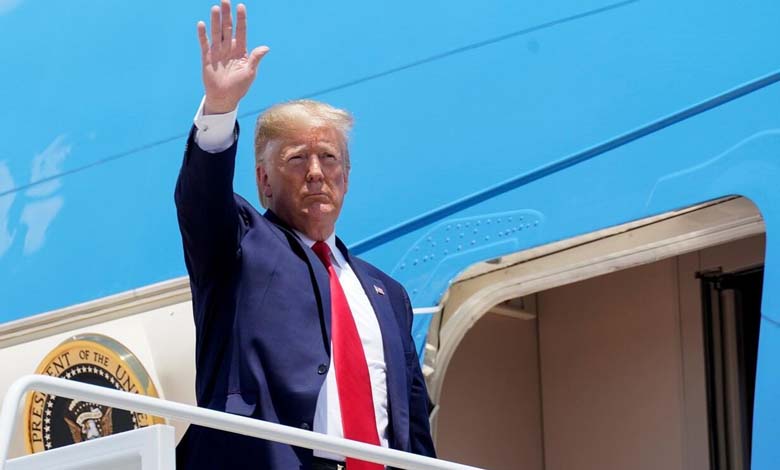
An adviser to Iran’s Supreme Leader has declared that bases used by U.S. forces to strike three Iranian nuclear sites will now be considered legitimate targets, amid ongoing military escalation between Tehran and Israel.
On Sunday, U.S. President Donald Trump hinted at his interest in regime change in Iran, despite earlier assurances from members of his administration that the American strikes on Iranian nuclear facilities were not aimed at toppling the regime. Meanwhile, the Israeli army continued targeting Iranian military positions.
-
Trump and Iran: 4 Possible Scenarios, Including “Shock and Awe”
-
Energy Investments: Iran’s New Card to Woo Trump and End Sanctions
Posting on his platform Truth Social, Trump said: “It may not be politically correct to use the term regime change, but if Iran’s current leadership is incapable of making Iran great again, then why not consider a change of regime?”
As Iran and Israel exchanged air and missile strikes, the world braced Monday for Tehran’s potential retaliation against the U.S. strike on its nuclear sites.
Iran vowed on Sunday to defend itself, a day after the United States joined Israel in the largest Western military action against the Islamic Republic since the 1979 revolution—despite global calls for restraint and a return to diplomacy.
-
Trump’s Pressure Pushes Iran to Accept U.S. Demands on Nuclear File
-
Iran’s Nuclear Program Back in the Spotlight… and Trump Seeks Political Breakthrough
Experts said commercial satellite images suggest that the U.S. strike on Iran’s Fordow nuclear facility caused significant damage and may have destroyed the site and its uranium enrichment centrifuges, although no official confirmation has been made.
In a new social media statement, Trump said: “Significant damage was inflicted on all of Iran’s nuclear facilities,” and added on Truth Social that “the most severe damage occurred below ground level.”
Earlier, the Republican president had warned Iran against any retaliation and urged the government to “make peace now,” otherwise “future attacks will be much bigger and far easier.”
-
Between Escalation and De-escalation: How Will Trump Handle Iran?
-
Trump’s Return Pushes European Powers to Demand Increased Pressure on Iran
Chairman of the Joint Chiefs of Staff, General Dan Keen, told reporters that the U.S. had launched 75 precision-guided munitions, including bunker-buster bombs and over 24 Tomahawk missiles, on three Iranian nuclear facilities.
The International Atomic Energy Agency (IAEA), a UN body, stated that no increase in radiation levels had been detected outside the targeted sites. Director General Rafael Grossi told CNN that the underground damage could not yet be assessed. A senior Iranian source reported that most of the highly enriched uranium at Fordow had been relocated before the attack.
Tehran, which insists its nuclear program is solely for peaceful purposes, responded by launching a barrage of missiles at Israel, injuring dozens and destroying buildings in Tel Aviv.
-
Iran Keeps Door Open for Dialogue with Trump and Prepares for New Sanctions
-
Mutual escalation between Iran and Israel despite calls for de-escalation
On Sunday, a senior adviser to Iran’s Supreme Leader said that any base used by U.S. forces to launch strikes on Iran would now be deemed a legitimate military target.
Ali Akbar Velayati told the official IRNA news agency: “Any country in the region or beyond that is used by American forces to strike Iran will be considered a legitimate target by our armed forces.”
However, in practice, Tehran has yet to act on its major threats—such as directly attacking U.S. bases or blocking oil shipments through the Strait of Hormuz.
-
If Trump refuses to strike Fordo.. What are Israel’s alternatives?
-
Zelensky Calls for Tougher Sanctions on Russia… Because of Iran
An attempt to close the Strait—vital for global oil exports—could send global oil prices soaring, damage the world economy, and trigger a confrontation with the U.S. Navy’s powerful Fifth Fleet stationed in the Gulf.
On Monday, oil prices surged to their highest levels since January. As of 05:03 GMT, Brent crude futures had risen by $1.52 (1.97%) to $78.53 per barrel, while U.S. West Texas Intermediate futures climbed $1.51 (2.04%) to $75.35 per barrel.
Iran’s parliament approved a motion to shut down the Strait, which it shares with Oman and the UAE. However, Press TV noted that such a move requires approval from the Supreme National Security Council, chaired by a figure appointed by Supreme Leader Ayatollah Ali Khamenei.
-
Israel-Iran War Enters Second Week: Firepower Overtakes Dialogue
-
Russia Warns Against Using Tactical Nuclear Weapons to Strike Iran’s Fordo Facility
General Keen stated that the U.S. military had increased protective measures for its forces in the region, including in Iraq and Syria. The U.S. State Department issued a global security alert for American citizens abroad, urging increased caution.
U.S. Secretary of State Marco Rubio called on China to urge Iran not to close the strait, telling Fox News that doing so would be “a grave mistake.”
He added: “It would be economic suicide for them. We have options to respond, but other countries should also consider the situation. This would damage their economies far worse than ours.”
-
US Strike on Iran Closer Than Ever
-
Missiles, Casualties, and Damage: Israel Reveals the Toll of Iranian Attacks
The Israeli army announced on Monday that it had launched a wave of overnight airstrikes involving around 20 aircraft targeting military sites in Tehran and western Iran. It stated that missile and radar infrastructure in Kermanshah, western Iran, had been struck, as well as a surface-to-air missile launch platform in Tehran.
Israeli defenses also intercepted a missile fired from Iran early Monday morning. Air raid sirens sounded throughout the night in Tel Aviv and other central areas of Israel.
According to Iranian news agencies, air defenses were activated in central Tehran to confront “hostile targets,” and Israeli airstrikes hit Parchin, a military complex southeast of the capital.
-
Iran Tests Trump’s Principles—Will He Fall Into the Trap His Predecessors Warned Against?
-
Hypersonic Missiles and Strikes on Nuclear Facilities: Day Six Between Iran and Israel
Israel’s public broadcasting authority reported that a Hermes-type Israeli drone had been shot down over Iranian territory, marking the fourth such loss since the beginning of the campaign.
On Sunday, Donald Trump once again raised the idea of regime change in Iran in a post on his Truth Social platform.
He wrote, “It may not be politically correct to use the term ‘regime change’, but if the current Iranian regime is incapable of making Iran great again, then why not consider a change of regime?”
-
Iran’s Fordow… a secret beneath the mountain impervious even to the most powerful bombs
-
Iran-Israel Escalation: Mass Launch of Evacuation and Withdrawal Phases
His post followed previous remarks from members of his administration, including Vice President J.D. Vance and Secretary of Defense Pete Hegseth, who stated that the U.S. was not working to overthrow the Iranian government.
Israeli officials have increasingly expressed their desire to bring down the hardline Shiite religious establishment. Israel initiated hostilities with a surprise attack on Iran on June 13.
Iranian Foreign Minister Abbas Araqchi is expected to meet with Russian President Vladimir Putin in Moscow on Monday. The Kremlin maintains a strategic partnership with Iran but also enjoys close ties with Israel.
-
Trump Pulls the Trigger Back: Why Did He Reject Israel’s Proposal to Assassinate Khamenei?
-
Iran and Israel: Cross-Strikes… Is There Still a Window for Nuclear Negotiations?
Speaking from Istanbul on Sunday, Araqchi said that Iran would consider all possible responses and that there would be no return to diplomacy before retaliating.
The Russian Foreign Ministry condemned the U.S. strikes, stating they undermined the Nuclear Non-Proliferation Treaty. It warned that “the risk of a broader conflict in the Middle East—already overwhelmed by crises—has significantly increased.”
The United Nations Security Council convened on Sunday to discuss the U.S. strikes, as Russia, China, and Pakistan proposed a resolution calling for an immediate and unconditional ceasefire in the Middle East.
-
Israel’s Strikes on Iranian Nuclear Facilities: Conflicting Assessments and Unclear Outcomes
-
Israel and Iran: Everything You Need to Know About The Fire Saturday
UN Secretary-General António Guterres told the Council that the U.S. bombing in Iran marked a dangerous turning point for the region and urged a return to negotiations regarding Iran’s nuclear program.
Airlines are currently assessing how long to suspend flights to the Middle East following the U.S. strike on Iran. The region has become increasingly vital for routes between Europe and Asia. However, the flight-tracking website FlightRadar24 showed that the skies over Iran, Iraq, Syria, and Israel were virtually empty on Sunday.


